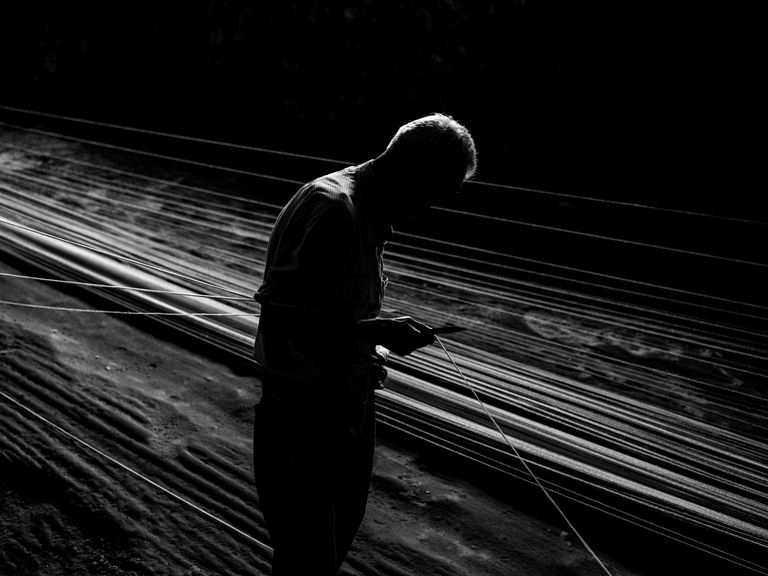Project Detail: A thread of life in the dark
Contest:
Swiss Storytelling Photo Grant 9th
Brand:
LuganoPhotoDays
Author:
Onur Coban
Project Info
A thread of life in the dark
Mehmet Ali Macit, 69, lives in Gaziantep, a major industrial city. He has been working on rope production looms since he was six years old. His father taught him this job. I talked to a few people who knew Mehmet Ali Macit. The people I interviewed are people who knew him and sometimes worked with him in the same cave. They told me that he was a very quiet man, that he loved to work and that he usually preferred to be alone. This is the reason why he works in the quieter parts of the cave.
Recently in Gaziantep, southeastern Turkey, I watched an old man walking back and forth with ropes in a dark cavern. A man whose feet were tired and whose body was stretched like twisted ropes, who bent a little as he walked. A man who could not get out of this cave he entered when he was a child, even in the last part of his life, holding on to life with the ropes he twisted and trying to keep his head upright. The ropes he twisted became his destiny, and his destiny was to work in a cave for life.
Mehmet Ali Macit, 69, lives in Gaziantep, a major industrial city. He has been working on rope production looms since he was six years old. His father taught him this job. I talked to a few people who knew Mehmet Ali Macit. The people I interviewed are people who knew him and sometimes worked with him in the same cave. They told me that he was a very quiet man, that he loved to work and that he usually preferred to be alone. This is the reason why he works in the quieter parts of the cave.
In this cave, hemp thread has been produced for more than two centuries and very traditional methods are used. It's not a place for technology. The cave is quite large and there are about 15-20 rope production looms. The cave consists of one large section and two smaller sections. The humid air of the cave makes the ropes of higher quality. Mehmet Ali can produce 30 kilos of yarn a day and his daily income varies between 250-350 TL (10-12 American dollars). He can work six days a week. He has some health problems due to his aging, but he comes to the cave and produces rope whenever he gets the chance. He is not a very talkative person; he is someone who enjoys working more than talking.
Mehmet Ali uses hemp material and waste materials from textile factories during rope production. The ropes he produces are sold to small businesses and used for making sacks. In addition, Mehmet Ali says that his ropes are also used to hang vegetables that people dry at home.
Thread production is a very tiring job. He has to walk 15-20 meters away from his loom and come back, again and again, so he walks about 20 km every day. Mehmet Ali refuses to work in modern and technological rope production factories because he thinks that the rope he produces is stronger and of higher quality.
He has worked in modern looms for a while, but he says he could not get used to both the factory environment and modern looms. He also says he has a connection with the cave that he cannot himself explain.
The name of the neighborhood where the cave is located is also very interesting. It is named “Şehreküstü”, which literally means “angry at/cross with the city”. It looks like a place where people who resent modern life come to live. It has nothing to do with technology. They do not use smartphones. Even though some university students work on other looms in the cave during the summer, they get angry and even swear as they work because they need the money they earn for their education.
While producing the threads, Mehmet Ali constantly walks and turns to the wooden loom and twists the threads he has lined up, making them even stronger. He looks so pensive while walking that I ask him what's on his mind.
“For me, life consists of work. I empty my mind as I walk, I experience a kind of purification”, he says. “This work relaxes me; it helps me to keep my mind open even if my body is tired.”
Due to urban transformation, the old buildings in the Şehreküstü neighborhood, where the cave is located, are demolished and new ones are built in their place. Mehmet Ali fears that the cave will be adversely affected by the ongoing construction works and the new settlements.
Mehmet Ali has spent almost his entire life working in this cave, and he is afraid that his life, which he clings to by producing rope, will be negatively affected in this semi-dark cave. As the ropes are stretched on the looms, they sometimes break and he has to start the process all over again. Mehmet Ali's life has been spent holding on to these ropes and he is very afraid of losing the cave.
“I grew up in this cave. I've been coming here since I was six years old, and now there are some rumors that the cave will be closed”, he says.
A section of the cave was damaged by the deadly earthquakes that stroke southeastern Turkey in February, but Mehmet Ali still works there despite all the risks. He says that his profession should be protected, that it is an art and should be supported. But he also says that the people working in this cave are the last masters of the profession and that his job will end after the few remaining people who master it die.
“I am the oldest of those who work here, I do not think that new masters will come after us”, he says. “It is a difficult and low-paying job, young people are interested in jobs that will bring more money. I am happy here. I do not know how long I can do it, but I will not waste my time thinking about tomorrow. I have a lot of work to do.”


















